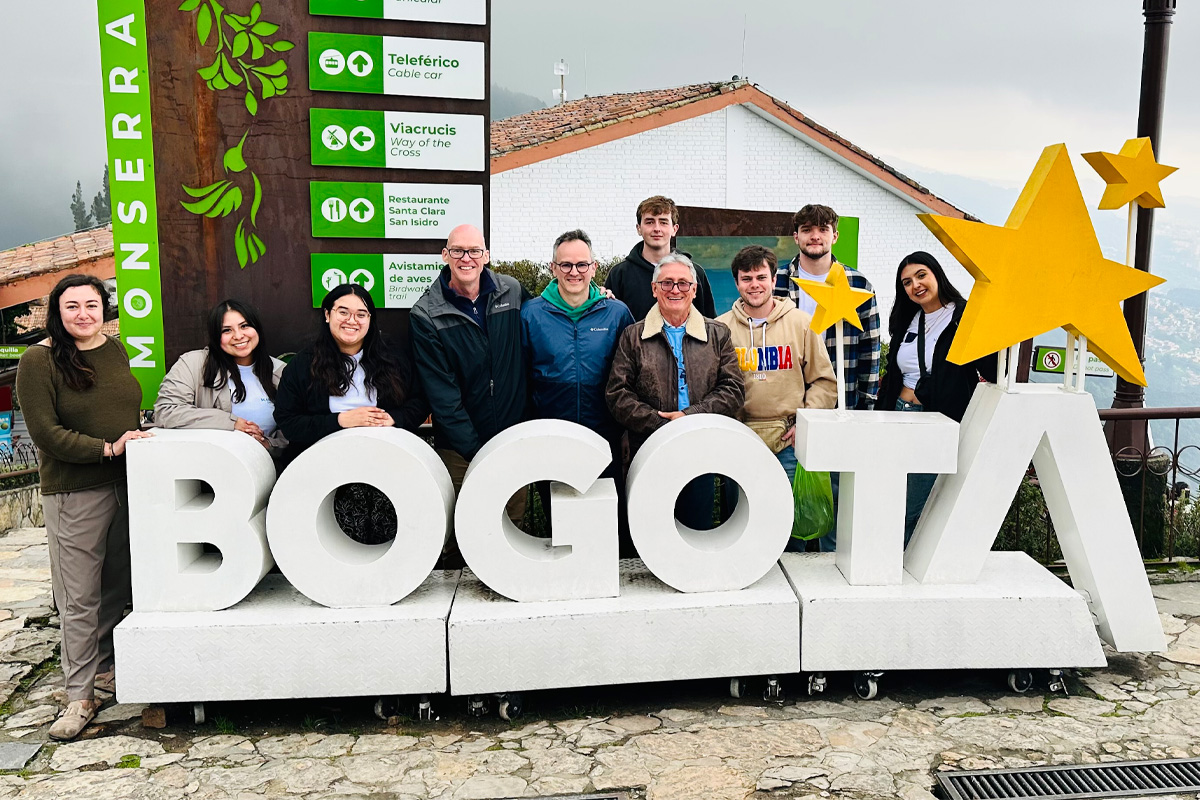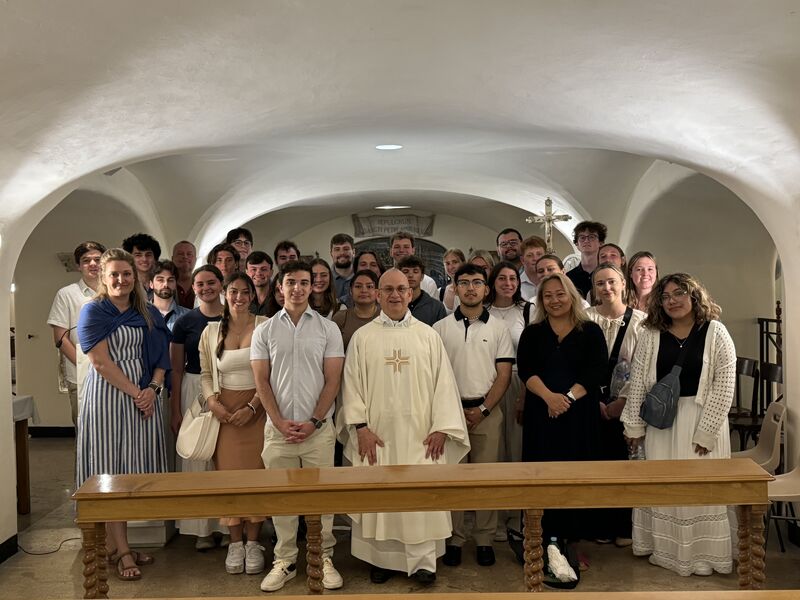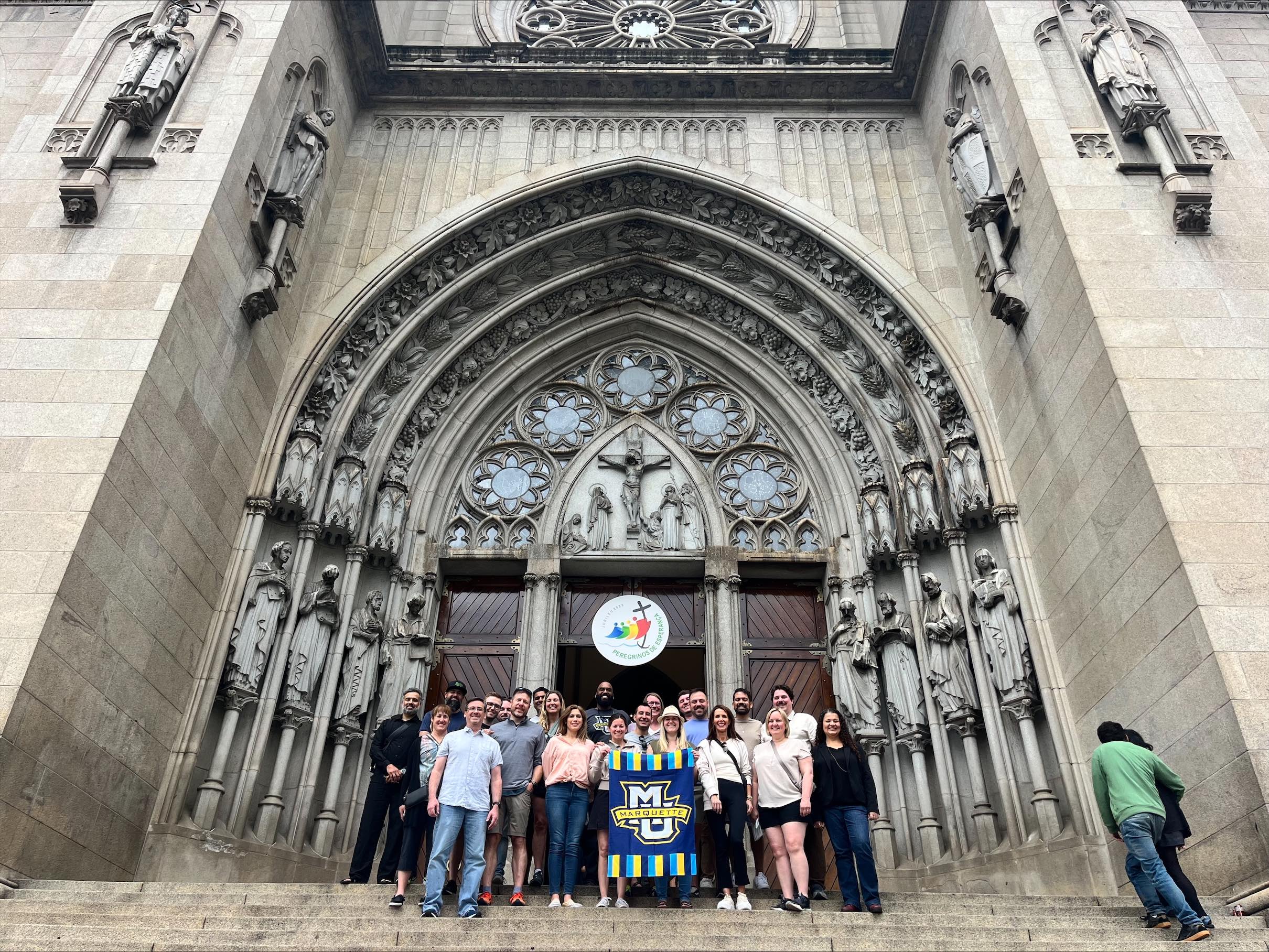Education Abroad

Education abroad experiences provide invaluable opportunities for students to learn in different educational environments and to gain firsthand exposure to other countries, cultures, societies and business practices.
The Office of International Business Studies (OIBS) assists Marquette Business students in finding education abroad programs and opportunities that fit their unique situations and goals. Where, when and for how long you study abroad will depend on your area of education, academic goals and preferences.
Marquette Business students can choose from fall or spring academic terms, full academic year programs, summer programs, and fall, winter and spring break programs. Break programs are offered through the college, while semester and academic year programs are offered through the Office of International Education.
- Semester and Academic Year Programs: Students who select this education abroad option attend one of our many partner universities around the world for a fall or spring term or for an academic year. Most programs offer both business and non-business courses and are taught in English and the local language. The Office of International Education can provide more information.
- Summer Programs: Students choosing this short-term education abroad option attend summer programs at our partner universities. These programs vary in length, start date and the number of credits offered. This is a great option for students who are unable to commit to the time and cost associated with a more traditional education abroad program.
Business European Travel Program-Antwerp

This three-credit course will provide students with an opportunity to study business, economic, social and cultural ramifications of the European Economic and Monetary Union. This course includes lectures by professors from the University of Antwerp as well as corporate visits. In the past, corporate visits included Ford Proving Grounds, Van Hool, Chocolate Factory, Diamond Polisher, family brewery, and Nike, as well as visits to the European Parliament in Brussels. Students, will also have a four day break to travel "on their own." ln the past, students have traveled to Rome, Munich, Madrid, Zurich, Salzburg, Barcelona, London. Anticipated cultural tours also include Brugge, Ghent, Amsterdam, and Paris. MORE INFO
Business European Travel Program-Rome

Rome, Italy’s capital, is a sprawling, cosmopolitan city with nearly 3,000 years of globally influential art, architecture and culture on display. Ancient ruins such as the Forum and the Colosseum evoke the power of the former Roman Empire. Vatican City, headquarters of the Roman Catholic Church, has St. Peter’s Basilica and the Vatican Museums, which house masterpieces such as Michelangelo’s Sistine Chapel frescoes. MORE INFO
Study in International Business for EMBA/MBA - Rio de Janeiro and Sao Paulo, Brazil

This program is designed for graduate business students in EMBA, MBA, and GSM programs with the aim of providing critical insight and valuable first-hand experience about culture, society, history, and business climate . Highlights of the study tour include:
- 9 days of activities in Brazil.
- Lectures in English on the economic, business and cultural behavior, provided by the faculty, business leaders, and practitioners in the field.
- Company visits including discussions by managers and executives.
- Faculty-Led Break Programs: These programs are created and led by a Marquette faculty member(s) during fall, winter and spring breaks. Faculty-led programs offer students the opportunity to participate in guided intentional learning programs that combine classroom work, either at Marquette or abroad, with cultural experiences and international site visits. This is great way to get international travel, earn three credits, and stay on track to graduate.
Accounting Marburg Travel Program (Fall Break)

Driven by the idea that national corporate governance systems differ due to several path dependencies such as different cultures and traditions, this course aims at exploring those differences by discussing and comparing relevant theoretical concepts and empirical results.
The course will address:
- Fundamentals of corporate governance, including definitions, basic questions, shareholder vs. stakeholder interests, corporate governance in specific economic systems, and regulatory policies.
- The legal view of corporations, including organizational structure, co-determination, and empirical evidence of regulatory effectiveness.
- Questions of ownership and control, including comparison of the modern corporations vs. private ownership, the role of managers and safeguards against managerialism, corporate governance codes and firm codes, and empirical evidence of effectiveness.
- International corporate governance, including alternative systems of corporate governance, capital market mechanisms, financial accounting and auditing mechanisms, and governance issues related to multinational enterprises.
Applied Global Business Learning (AGBL) - Guatemala (Spring Break)
MU Applied Global Business Learning is a multi-disciplinary, service-learning experience. AGBL students travel around the world to work with entrepreneurs to improve their businesses by applying classroom knowledge and to gain real world appreciation for the complexities of entrepreneurship. Through developing businesses, we are developing communities and following in the strong Jesuit tradition and commitment to public service.
Participants receive information and classroom preparation on the hazards and major political or economic events currently impacting the country for their trip. The group begins to discuss which of these events would be most likely to impact a small business (or the small business that they will work with if that information is available in advance). This takes place over 5 to 7 meetings during the semester, often sharing space with groups going to other AGBL locations. Comparisons and similarities become a topic of discussion as the students begin to see where the struggles lie for citizens of their chosen location.
Once in the country, the trip begins with a meeting with the entrepreneurs. Participants listen to the entrepreneurs describe their business and conduct a SWOT analysis of the business. During this process the participants will be able to identify a few ways in which they can best help the entrepreneurs. This has been different for every trip, but we have investigated everything from finding new suppliers of inputs to their business, helped with pricing and inventory strategies, found stores willing to display and sell products for the entrepreneurs, and built signs to give the firm an idea of marketing to the local market.
Conducting Business in Czechia - Pilsen and Prague (Spring Break)

This course provides an overview of a range of international business issues, with a focus on Central Europe and the Czech Republic. The course will cover language and history (with a focus on the Czech Republic), exchange rate risk, exchange rate management, supply chain management, and business logistics, while working in teams across countries. This is a synchronized course in that it is a shared-class with the University of West Bohemia. It is also a faculty-led travel course leveraging cultural and business visits that cannot be accomplished in a traditional classroom. The objective of this faculty-led shared course, therefore, is for the student to develop a global cultural and business mindset. MORE INFO
Global Supply Chain Sustainability Program - Bogota, Colombia (Spring Break)

This applied study-abroad course immerses students in the end-to-end Colombian coffee supply chain, cultivating globally minded and ethically grounded supply-chain professionals. By integrating four preparatory modules with a week-long practicum in Bogotá and the Choachí growing region, participants will: (1) map and critically analyze production, logistics, customs-compliance, and export milestones; (2) assess Colombia’s strategic position in regional and global value chains and compare it with other emerging economies; (3) diagnose how infrastructure, trade policy, and security shape supply-chain resilience in developing contexts; (4) appraise sustainability challenges and innovations—from regenerative farming to traceability—and propose improvement initiatives; (5) strengthen cultural fluency and professional networks through collaboration with CESA faculty, local firms, and entrepreneurs; and (6) synthesise insights in a simulation-based capstone presentation. Emphasis on experiential learning, critical reflection, and evidence-based problem solving prepares students for data-supported decision making, effective supply-chain leadership in volatile markets, and enhanced career readiness across multidisciplinary business functions. MORE INFO
Switzerland Commercial Banking Study Abroad - Zurich, Winterthur (Spring Break)

The Commercial Banking in Switzerland program is open to undergraduate finance students and graduate students in the MSF and MBA programs. Students outside of finance should contact Kent Belasco (kent.belasco@marquette.edu) to evaluate if this program might be a good fit. Preference given to students that have completed or taken concurrently FINA 3001 and/or finance majors.
- Program in English at ZHAW (Zurich University of Applied Sciences)
- Open to undergraduate students
- Three (3) Marquette credits
- Includes planned educational tours
- Some flexibility in travel arrangements may be available at the student’s cost.
Business Culture & Marketing in Santiago
This program highlights several companies and industries that participants visit during their international experience with real life exposure to a variety of international sectors and functions. The course combines marketing and business information with the culture of Santiago, Chile to allow participants to compare and contrast business practices of both Chile and the United States.
Learning Outcomes: By the end of this course, you should be able to:
1. Compare and contrast marketing strategies between Chile and the United States.
2. Discuss the relationship between Chile and the world from a cultural and business marketing perspective.
3. Compare and contrast communication and sales styles between Chile and the United States.
4. Reflect on various in-person visits throughout the trip.
Contacts
Office Hours
By appointment only- Plan your education abroad experience
- FAQs
It’s never too early to start planning! Here are the steps that you can take right now to begin thinking about your education abroad experience:
- Attend a Study Abroad 101 Session, held every Friday from 3-4 p.m. in the Office of International Education Program Center, Holthusen Hall, Fourth Floor. This session is designed for students at the very beginning stages of the education abroad process. Session topics include how to select a program, academic planning, application procedures and financial aid.
- Complete the Education Abroad Questionnaire that will help understand your goals and desires.
Then complete the Big Five Inventory of Personality and bring both of them to your meeting. - See our staff during their regular office hours. Email internationalbusiness@marquette.edu to schedule an appointment to discuss your best options for an education abroad experience.
- Once you’ve met with us, we will suggest to you a range of education abroad experiences that meet your goals and preferences. Research each of these offerings and make a list of preferences.
- Then submit your application! Remember these application deadlines:
- October 1 for education abroad in the spring academic term
- March 1 for education abroad in the summer or fall academic terms
- See individual faculty-led programs to determine the application deadlines for programs in which you are interested
- Once you are accepted to a program that you are willing to accept, complete all of the post-acceptance materials and program-specific requirements. This will include getting your passport and visa, completing partner application materials, researching partner course offerings and completing a Course Approval Form.
- Finally, before you leave, attend the in-person Pre-Departure Orientation and meet with us to make sure that everything is prepared both for your education abroad experience and for your return.
Frequently Asked Questions (FAQs)
General Questions
I want to study abroad, but I don't know what my options are. Where do I start?
Start by attending a Study Abroad 101 session at OIE, and then complete the Education Abroad Questionnaire and Big Five Personality Inventory. After that, meet with us to discuss which education abroad experiences might fit you best.
Do I have to speak a foreign language to study abroad?
No. While some programs do require a certain foreign language proficiency so that you can take classes in the local language, many programs are in English. For longer programs, you may have to participate in basic language proficiency training.
When is the best time to go abroad?
Business students go abroad as soon as the summer after freshman year of study and through second semester of their senior year of study. Traveling earlier in your course of study can provide more flexibility in choosing courses that you really want to take and frees students to take the internships that they need to be competitive for jobs when they graduate. The best time to study abroad will depend on your area of study, academic goals and preferences.
Can I study abroad and still graduate on time?
If you plan carefully, studying abroad should not delay your graduation. However, it is important to be proactive and begin thinking about your education abroad plans as soon as possible to avoid potential problems. Business students will work directly with the Office of International Business Studies to plan their education abroad experience. In addition, winter break, spring break and summer programs can almost always provide education abroad experiences with no effect on your regular course of study.
When should I start applying to study abroad?
After you attend a Study Abroad 101 session, schedule an appointment with us. The staff will review your education abroad options and guide you through the initial decision and applications phase. You must meet with us before you apply to study abroad. The deadline to apply for study abroad in spring 2020 is October 1. The deadline to study in summer or fall is March 1.
Can students with disabilities apply for study abroad programs?
Absolutely. Education abroad opportunities are open to all students. Students are encouraged to apply regardless of gender, ethnic background, sexual orientation, socio-economic status or disability. OIBS works with various offices on campus to support and advise any student interested in studying abroad.
What if I am interested in a country in which Marquette does not have a program?
Marquette offers programs in nearly 30 countries that are in line with Marquette’s academic requirements and university values. However, if you feel that a non-Marquette approved program better suits your academic and education abroad goals, OIBS can guide you through the approval process. If you do choose a non-Marquette program, it will be your responsibility to make all study abroad arrangements, including anything related to your academic courses, travel and housing, finances, and health and safety.
How do I meet with an OIBS representative?
Please email us at internationalbusiness@marquette.edu or call (414) 288-3433 to schedule an appointment to discuss your best options for an education abroad experience. Our office is in O'Brien Hall 111.
Financial Aid
Will I still receive my financial aid and Marquette scholarships?
If you are studying abroad on a Marquette approved program, both federal aid and institutional aid (Marquette grants and scholarships) should apply. Please visit the Financial Aid page for more information. We also recommend that you speak with a financial aid counselor during the application process.
How expensive will education abroad be compared with staying at Marquette?
Many of our education abroad programs are exchange programs. This means that you pay Marquette’s tuition to study abroad. The cost of living in the cities where we have programs varies. Some locations might be more expensive than Milwaukee, while others are more affordable. Budget sheets are available for each program on the Marquette Study Abroad website. If you are concerned about program costs, please be sure to discuss this during your study abroad advising appointment.
Are scholarships available to help me with other costs, such as travel, books and housing?
Please visit the Study Abroad Scholarships page for more information about additional scholarship opportunities that you can pursue.
Grades, Credits and Courses
What courses can I take while on a education abroad program?
Course offerings depend on your program of study at Marquette and where you choose to study abroad. Most programs offer a mix of business and non-business courses. You can find more information about the course offerings at a particular program on the Marquette Study Abroad site. As you prepare to study abroad, you will work with your program coordinator to develop a list of course options that are approved for you to take while abroad.
Will my grades from education abroad transfer and be figured into my overall GPA?
This depends on the program. For most semester-long study abroad programs, your grades will not transfer to Marquette and your GPA will not be affected. Credits will only transfer back to Marquette if you receive a grade equivalent to C or higher from your host university. For Marquette-sponsored and faculty-led programs, grades assigned will be included in your GPA.
Will my credits automatically transfer back to Marquette?
We will notify you when we receive your study abroad transcript from our partner university. Please allow for one month of processing time for your study abroad credits to appear on your Marquette transcript.
Health and Safety
How does Marquette prepare students for health and safety issues they may encounter while abroad?
You will complete both an online and in-person health and safety orientation prior to your departure for study abroad. Once abroad, you will receive a site-specific orientation that will review any local health precautions and safety concerns. Students will be asked to complete the U.S. government’s STEP program (Smart Traveler Enrollment Program), which provides important information about the safety conditions in your destination country and alerts you of any emergency situations.
Do I need to purchase international health insurance for my time abroad?
No. You will be automatically enrolled in an international health insurance plan by Marquette. This plan will cover you during your study abroad program. More information will be provided about the plan and its coverage once you have been enrolled.
Traveling and Living Abroad
Where will I live while I am studying abroad?
There are many housing options to choose from while studying abroad, including on-campus student dorms, off-campus student residences, apartments and host-family living arrangements. Some universities provide on-campus accommodations, while others are unable to do so. However, all of our partner institutions are able to assist with your housing search and can provide you with additional recommendations.
Can I travel to other cities and countries while I’m abroad?
Yes, this is a great benefit of an education abroad experience. However, you must register all side trips on the Marquette Study Abroad site. This allows us to contact you in case of an emergency. Also, each university has its own rules and requirements about class participation. You should be aware of these and if necessary, talk to a professor before planning side trips that conflict with your classes.
Will I need a passport and visa to study abroad?
Yes, you will need a passport to travel abroad. You will most likely need a visa but should check your program-specific requirements for more details.
Will Marquette help me book a flight to my program?
Depending on the program, you may be responsible for travel to and from your program location. This includes short-term and faculty-led programs as well.
Resources for Parents
Where can my parents get more information about my study abroad experience?
Due to FERPA regulations, the university cannot disclose information regarding your education records and related education abroad plans to your parents unless you have authorized the university to do so in writing. Therefore, it is extremely important that you discuss your education abroad plans and share all relevant information with your parents. There is also a Parent Webinar available online that we highly recommend parents watch. It answers many questions they might have pertaining to your education abroad experience.
*If you are not a College of Business Administration student but are interested in studying abroad, please visit Marquette’s Study Abroad page.
